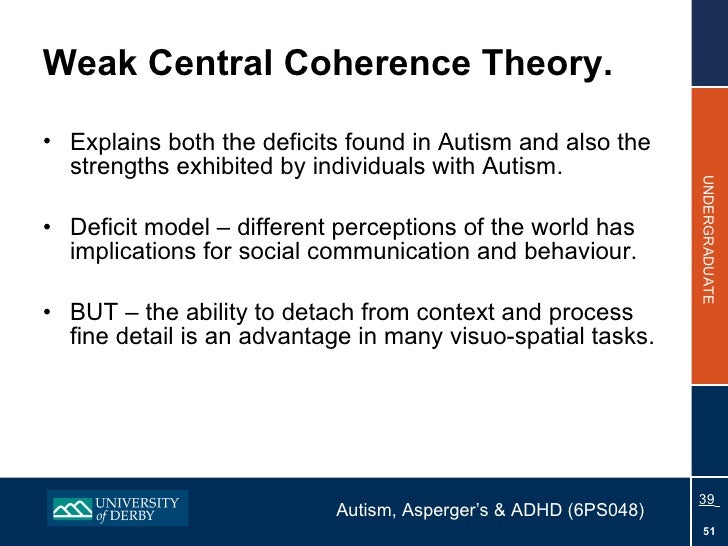
Consequently, I use the term ASD throughout this work to refer to the group comprised only by autistic disorder and Asperger's syndrome, whereas both disorders are mentioned separately when they are not forming a group in some mentioned study in this text. This observation is important because it is hard, if not impossible, to make a cognitive theory on disorders that do not share clinical and etiological features. However, considering that the diagnosis of PDD-NOS does not require the presence of the three diagnostic domains of the autistic triad (social interaction, communicative capacity and behavioral flexibility), the inclusion of PDD-NOS as an ASD has been questioned. The term autism spectrum disorders (ASD), which has been used by some mental health professionals as a synonym of pervasive developmental disorder (PDD), implies that these impairments are shared among autistic disorder, Asperger's syndrome, and pervasive developmental disorder not otherwise specified (PDD-NOS). Hence, in the present paper I review the reasoning in favor of the theory of mind deficit but with a new interpretation based on the mnesic imbalance theory, which posits that faulty procedural memory causes deficits in several cognitive skills, resulting in poor performance in theory of mind tasks.Īutistic disorder is characterized by impairments in reciprocal social interaction, communicative capacity, and repetitive patterns of behavior (core triad). Currently, however, the empathizing-systemizing (a newer version of the theory of mind deficit account) and mnesic imbalance theories are the only ones that attempt to explain all these core triadic symptoms of ASD On the other hand, theory of mind deficit in empathizing-systemizing theory is the most influential account for ASD, but its counterpart in the mnesic imbalance theory, faulty procedural memory, seems to occur earlier in development consequently, this might be a better solution to the problem of the etiology of ASD, if it truly meets the precedence criterion. Three major cognitive theories (theory of mind deficit, weak central coherence, and executive dysfunction) seem to explain many of these impairments.

All rights reserved.Individuals with autism spectrum disorders (ASD) have impairments in social interaction, communicative capacity, and behavioral flexibility (core triad). The Sentence Completion Task was found to be a useful test instrument, capable of tapping local processing bias in a range of populations. The results suggest that the Sentence Completion Task can reveal individual differences in cognitive style unrelated to IQ in typical development, that most (but not all) people with ASD show weak coherence on this task, and that performance is not related to inhibitory control. We report results from three studies assessing (a) 176 typically developing (TD) 8- to 25-year-olds, (b) individuals with ASD and matched controls, and (c) matched groups with ASD or attention deficit/hyperactivity disorder (ADHD). We present a brief and easy-to-administer test of coherence requiring global sentence completions. Little research has examined whether individual differences in this cognitive style can be found in typical development, independent of intelligence, and how local processing relates to executive control. A local processing bias, referred to as "weak central coherence," has been postulated to underlie key aspects of autism spectrum disorder (ASD).


 0 kommentar(er)
0 kommentar(er)
